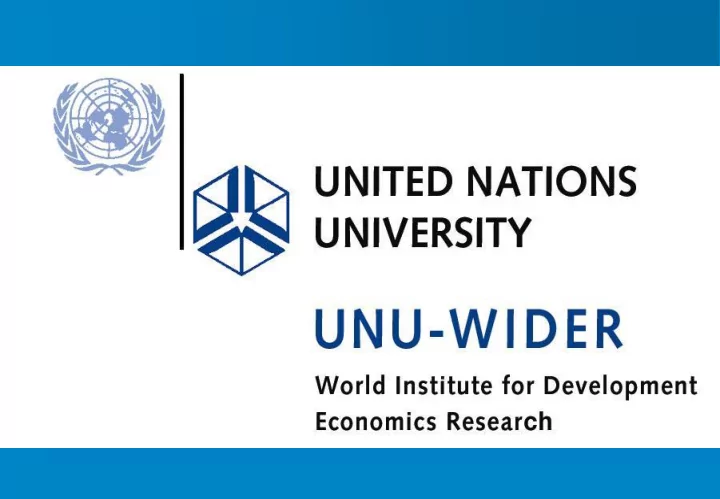

UNU-WIDER: Some Basic Questions • What is it? • What does it do? • Why should we care? • Opportunities for collaboration ? • Any perspectives? • http://www.wider.unu.edu/
UNU-WIDER – What is It? • WIDER is the first research and training centre of the United Nations University (UNU) established in Helsinki, Finland, 1984 • WIDER - from where did the acronym come? • 8 - 10 research staff, a secretariat and an international network of international researchers • A research (and training) institute with funds (about 4.5 mill. US$/year – with 50-50 funding situation) – but not a funder of research ...
UN University worldwide
UNU-WIDER – What Does it Do? • Undertakes research and policy analysis on issues that affect the living conditions of the world’s poorest people • Provides a forum for professional interaction and for the advocacy of policies for robust, equitable, gender- balanced, and environmentally sustainable growth • Promotes capacity building and training for scholars and policymakers
UNU- WIDER’s Main Partners Academic Institutions and Research Centres Nordic Governments UNU and RTCs WIDER and Communities UN, UNDP, UNRISD, World Bank, UNHCR, UNCTAD, ILO, IMF
Activities Programme for visitors Research Sabbatical programme for scholars to Recent research projects have undertake research on topics related covered themes such as: poverty and to WIDER’s research programme inequality; development finance; growth and trade; conflict and Internship for PhD students reconstruction; international migration in economics Teaching Annual Lectures Courses in development economics at Douglass North Kaushik Basu universities in Helsinki and elsewhere Joseph Stiglitz Dani Rodrik Anthony Atkinson Nancy Birdsall Jagdish Bhagwati Public Lectures Angus S. Deaton Frances Stewart Kemal Dervis Public lectures are given by WIDER Jeffrey Williamson Deepak Nayyar research staff and visiting scholars
WIDER Publications Over 1500 titles , issues of WIDER Discussion Papers, journals, >120 commercially Research Papers, Policy published books (2/3 of Briefs, and other publications OUP development available on the website economics books!) WIDER Angle newsletter is WIDER website is a search- a monthly email update, with able source of information and online and printed editions publications, including the WIID: www.wider.unu.edu that summarize our research and activities for a worldwide audience
Past Themes • Conflict and Humanitarian Emergencies • Causes of Rising Income Inequality • Poverty and Vulnerability • Reform of Global Institutions • Global Digital Economy • Sustainability of Development Finance • Spatial Disparities in Human Development • Millennium Development Goals • Impact of the WTO Agreement on Low Income Countries • Long Term Development in the CFA Zone Countries
Recent Projects • International Migration & the Mobility of Talent • New Sources of Finance for Developing Countries • Financial Sector Development • Development Aid • Institutions for Economic Development • Conflict and Reconstruction • Measuring Human Well-being • Inequality and Poverty in China • Hunger and Food Security • Global Trends in Inequality and Poverty
Current Projects • Building African Capacity for Policy Simulation • World Distribution of Wealth • Globalization and Poverty • Southern Engines of Growth • Fragility and Development • Health Inequalities and Development • Development in an Urban World • Country Role Models for Development Success • Promoting Entrepreneurial Capacity • African Development: Myths and Realities
WIDER Helsinki Conferences • Making Peace Work June 2004 • Unlocking Human Potential: Linking the Informal and Formal Sectors September 2004 • WIDER Thinking Ahead: The Future of Development Economics June 2005 • Aid: Principles, Policies and Performance June 2006 • Advancing Health Equity September 2006 • Fragile States – Fragile Groups June 2007 • Southern Engines of Global Growth September 2008 • Country Role Models for Development Success June 2008 • Frontiers of Poverty Analysis September 2008 • The Role of Elites in Economic Development June 2009 • Reflections on Transition: Twenty Years After the Fall of the Berlin Wall September 2009
UNU-WIDER: Why Should We Care? • An independent voice, a global network of scholars ....... • A builder of bridges into the UN system and back • Jobs and research opportunities • Visiting scholars’ programme • Ph.D. Internships • NNDE: we could use and influence WIDER actively
UNU-WIDER: A Perspective on Collaborative Research Possibilities • The 2010-2011 strategy/work plan in the making • Three pillars (the triple crises): food and agriculture, the economic crisis, climate change • Cross-cutting: inequality and poverty, foreign aid, governance • Now looking for concrete activities/partners
UNU-WIDER: Conclusion • Nordic countries recognized world leaders in commitment to development and to the environment • Should assume a distinct intellectual leadership role in the field of development economics research • UNU-WIDER is only UN research institute in Nordic countries – it is there – use it ... • Next NCDE – 2010 • Teaching and capacity building: WIDER, AERC and the Nordic countries – possibly very exiting and rewarding • How to engage, mobilize funding etc
UNU-WIDER: A Post Script • The draft strategy looks good and should provide a good framework (or bone work) for the meat. The devil will be in the detail and in the individual decisions you make to say yes and no. The broad vision will help, but it will only crystallize in the actual decision making. • An observation: I think the teaching materials on the web targeted to developing countries is a great idea and should be a major focus. More thought and preliminary piloting would be needed to identify more clearly the nature of the gap and what skills (pedagogical, curriculum design, distance learning etc) that would be needed to implement this.
Recommend
More recommend